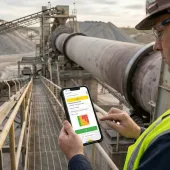Health and Safety at Work

First published in the December 2016 issue of Quarry Management
A report on the fifth annual safety conference hosted by IQ’s Derbyshire branch and the HSE at the Proact Stadium in Chesterfield
On 5 October 2016, the Derbyshire branch returned to the Proact Stadium in Chesterfield for its fifth annual Health & Safety Conference. The event began with an introduction from John McGough, chair of the Derbyshire branch, followed by a statistics/QNJAC update by Roy Bush of the Health and Safety Executive (HSE).
Mr Bush began with some good news – that the industry has seen an 86% reduction in accident rates between 2000 and 2010. That said, however, in the last six years performance appears to have peaked, and taking into account the 30% contraction the industry suffered in the recession there has in fact been a slight increase in accidents. Mr Bush emphasized the importance of breaking through this plateau in order to move forward in the quest for Zero Harm, and encouraged the audience to utilize the new QNJAC guidance for 2016, highlights of which include: a point of delivery checklist for delivery drivers that identifies site conditions and rates them red, amber or green; new welfare facilities guidance for contractors; and toolbox talks relating to blasting fumes and explosives handling. All of these can be found on the QNJAC smartphone app.
Next, retired HSE inspector Richard Noble shared his experiences with a presentation entitled: ‘Reflections on my employment with the HSE’. Mr Noble’s career spanned five decades and a wide range of roles, including road supervisor in Manchester, quarry manager at various sites in the Midlands, works manager at Shelton steelworks in Stoke, and quarry inspector. During his time as a quarry inspector, Mr Noble took part in the first successful disqualification of a chalk quarry director who continuously defied HSE and court instructions. He also arranged the first safety seminar between the quarry inspectorate and quarry owners, which became the foundation for the health and safety conferences held today.
Alan Millband of Howes Percival LLP followed with ‘Health & Safety Sentencing – the Definitive Guideline’, a review of the definitive sentencing guideline that came into effect in February this year. The new regime is more structured and consistent, and is driven by the potential harm and risk of a case, as opposed to the previous version that focused more on the outcome. In addition, there are now offence categories that are dependent upon severity, and once determined courts refer to tables to identify the range and starting point of the fine. These tables vary according to an organization’s size, with particular attention paid to annual turnover. This account information must be disclosed and failure to do so will push the courts to work off the table scale. Overall, fines will be higher under the new guidelines and will punish organizations much more.
After the coffee break, Steve Parfitt of Mentor Training Solutions demonstrated the ‘holistic approach’ to plant operator training and competency. He began with some eye-opening MPA mobile plant statistics from 2014–2015, which showed 203 lost days caused by LTIs due to improper operation of mobile plant. Mr Parfitt went on to look at operator selection and asked the audience about the age limit for young people operating mobile plant. Everyone was surprised to know that there is no legal limit. Selection criteria should take account of inexperience, degree of exposure to physical risk, and the type and size of plant being operated. The fact that a large proportion of mobile plant incidents are due to poor supervision emphasized the importance of competent supervision, as highlighted in Reg. 9 of the Quarry Regulations. Lastly, for a safer, more competent operator, employers should ensure the correct selection, training, assessment and supervision. This will help create a safer workforce that benefits everyone.
Roy Bush returned to the stage for ‘Helping Great Britain work well’, which consisted of the HSE’s new 10-goal strategy and how this links in with the quarrying industry. Fortunately, QNJAC has already tackled most of the goals, but there is still a need to focus on the core aims: building competence, involving workforces, creating healthier workplaces, and effective leadership. Mr Bush emphasized that leadership is not just about rebranding ‘managers’ as ‘leaders’ and went on to quote Gen. Mark Walsh – a retired US Air Force officer – who said: ‘Leadership is a gift given by those who follow, but you have to be worthy of it’. An effective leader accepts fault, is positive, sees and develops potential, does not hold grudges, and, most importantly of all, recognizes that the title must be earned. Organizations should be wary of this when selecting managers for the future.
The afternoon session began with an energetic session from Juice Learning, who burst into the room with a stretcher for their theatrical piece about a quarry worker injured at work and taken to hospital. Senior facilitator Scott Worsfold introduced the team and set out the themes for the session: Don’t walk by; Leading safety; Personal responsibility; and Mindset for a world-class safety culture. Juice Learning delivered these themes through their unique blend of interactive and theatrical learning techniques. Mr Worsfold started by getting each table to discuss their worst safety experience and then asked everyone to vote on whether or not they thought there was room to improve their workplace health and safety culture. This was reinforced by ‘Who creates the culture?’, another theatrical piece about an operative leading safety in the workplace instead of his supervisor.
Afterwards, Mr Worsfold asked the audience to stand if they ever exceeded the speed limit on the motorway, and asked for reasons why. This led on to how attitude influences an individual’s decision to break the rules, whether through overconfidence, recklessness or complacency. The final performance, ‘Picking up the pieces’, cast a harsh light on the effects that attitudes and decisions can have in the workplace. In this piece, the operative who led the safety culture at the beginning was severely injured after his attitude towards safety had been negatively influenced by his supervisor, causing him to take a silly risk and ignore the rules.
After a huge round of applause for Juice Learning, John McGough brought the event to a close and thanked the venue staff, organizers and all the presenters for their hard work in making the conference another great success.
- Subscribe to Quarry Management, the monthly journal for the mineral products industry, to read articles before they appear on Agg-Net.com








